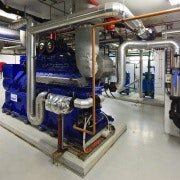CLIMATE SPECTATOR: Gillard ready for a 'clean' fight
Prime Minister Julia Gillard yesterday shocked the nation, calling an election for September 14.
The first thing to strike many about the news was, for once, it wasn't a politician garnering attention for saying something ill-considered or downright offensive. (Although the decision to have the election on Yom Kippur raised a few eyebrows.)
The second was that Gillard's move tempered any momentum Tony Abbott had stirred over the weekend, which he had hoped to strengthen in an address to the National Press Club today. Instead, he has had to tweak that speech and prepare for a raft of questions.
There are those who will contend the early call unnecessarily drags out the election campaign, but given the woeful state of Australian politics last year, things can't get much worse.
There are also those who will say it is merely a ploy from the prime minister to shore up her leadership, but that already appeared assured through to the election.
Conspiracies and conjecture, but none of it matters. What does is that on September 14 we will go to the polls, in what will be one of the more important elections for the clean energy sector.
Labor is content with what it has done on climate change and emissions reduction, with the carbon price the centrepiece of a strategy that includes the bipartisan renewable energy target, the $3.2 billion Australian Renewable Energy Agency and the $10 billion Clean Energy Finance Corporation.
"As we live through climate change, we've done, painfully but for the good, the single biggest thing we need to in order to reduce carbon pollution – pricing carbon,” Gillard proclaimed in her speech yesterday.
If the Coalition gains power it will scrap the CEFC, do its best to get rid of the carbon tax but remains supportive of ARENA although may change its technology priorities.
Neither side of politics has yet responded to the RET Review but it appears Labor is keen to stick with the current fixed target, as recommended by the Climate Change Authority. The Coalition is committed to the RET, but is yet to make clear its commitment that the gigawatt-hour level of the target will remain unchanged instead of substantially scaled-down to EnergyAustralia's ‘real 20 per cent' notion.
The Coalition has stuck with its controversial direct action plan and promises to mobilise a ‘green army' if it receives the nod from voters. The problem with the strategy is it's big on ideology, short on detail. As Tristan Edis said on Tuesday, "more policy detail is the only antidote to scepticism surrounding the Coalition's commitment to its 2020 emission reduction target.”
There have been serious questions raised as to whether direct action can achieve its aims in a way that doesn't blow the budget. Indeed, it seems that the decision to call an election is in part a Labor ploy to get the Coalition to start showing their policies can be cost effective.
"It means all parties will have ample time to release their policies and have them fully costed so they can be considered by voters,” Labor MP Bill Shorten said while blogging with the Herald Sun. "By announcing the date early it means there's less chance for spin and more chance for substance from the Opposition.”
This was followed by a press release from Climate Change Minister Greg Combet and Parliamentary Secretary for Climate Change Mark Dreyfus calling on the Coalition to answer a series of questions on direct action: specifically into how it will reduce emissions by 5 per cent come 2020 and how much it will cost.
Meanwhile, Opposition climate spokesperson Greg Hunt took to Twitter to once again imply the election would be a referendum on carbon pricing: "Finally voters will have their say on the carbon tax and electricity prices on September 14.”
Abbott also reiterated plans to abolish the carbon tax, while alluding to "positive plans for a cleaner environment with incentives to do the right thing, not penalties.”
Let's hope the lead up to the election sees genuine debate on the right policies to reduce carbon emissions, rather than just rhetoric and a fight over the carbon tax. If not, it's going to be a long eight months.
















